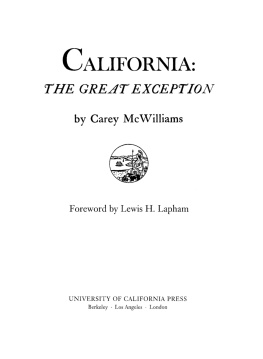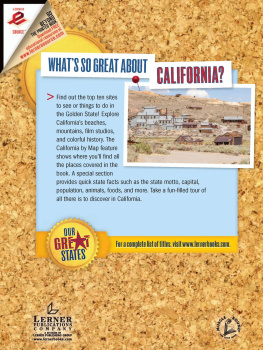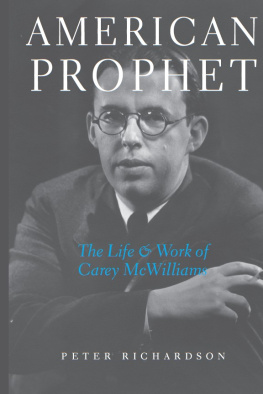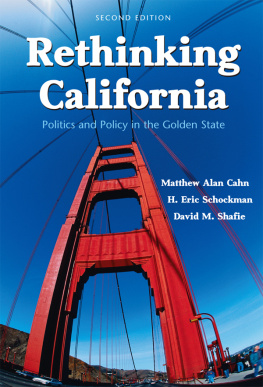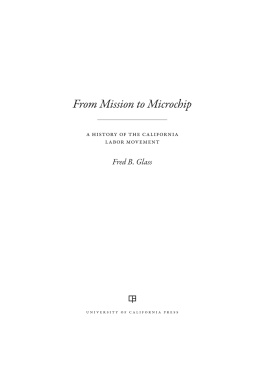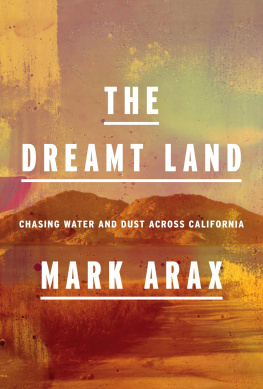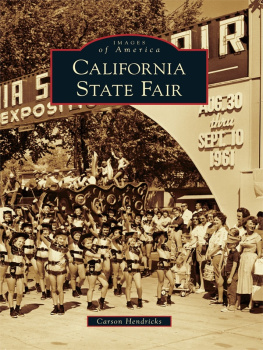CALIFORNIA:
THE GREAT EXCEPTION
by Carey McWilliams
Foreword by Lewis H. Lapham
UNIVERSITY OF CALIFORNIA PRESS
Berkeley Los Angeles London
University of California Press
Berkeley and Los Angeles, California
University of California Press, Ltd.
London, England
Copyright 1949 by Carey McWilliams
Copyright renewed 1974 by Carey McWilliams
Foreword copyright 1998 by Lewis H. Lapham
First California Paperback Printing 1999
Library of Congress Cataloging-in-Publication Data
McWilliams, Carey, 19051980
California, the great exception / by Carey McWilliams.
p. cm.
Originally published: New York : Current Books, 1949.
Includes index.
ISBN 978-0-520-21893-2 (alk. paper)
eISBN 9780520922983
1. CaliforniaMiscellanea. I. Title.
F861.M25 1999
979.4dc21
98-42930
CIP
For a fine fellow
JERRY ROSS McWILLIAMS
TABLE OF CONTENTS
FOREWORD

CAREY MCWILLIAMS published California: The Great Exceptionin 1949, and the California that he describes is the one that I rememberas a boy growing up in San Francisco during the excitements ofthe Second World War. He writes about a port that was then thebusiest on the American Pacific coast, and I can still see the crowd ofships, aircraft carriers as well as cargo vessels, riding at anchor in thebay; he mentions the names of once prominent citizens, and I can seethe people in the streets dressed as characters from a script byRaymond Chandler. The men wore hats and double-breasted suits;the women wore fur and high-heeled shoes. Together they danced tothe music of Cole Porter and the Andrew Sisters. Veronica Lake wasin love with Alan Ladd, a computer was a giant robot confined to therealm of science fiction, San Jose was somewhere vaguely south on ElCamino Real, a dusty farm town where Mexicans wrapped in blanketsdozed in the shade of the eucalyptus trees, and if Herb Caen had beenasked to guess what was meant by the word silicon, he most likelywould have said something about an insect repellent or a Chinesetailor who had figured a new way to make silk shirts.
The changes brought about by the passage of the last fifty yearshave been many and various, but none of them seem to me moreremarkable than McWilliams understanding of what hasnt changed.Although most of his statistics have faded and nearly all of his projectionshave proved too modest, his book remains current because itproceeds from his appreciation of California as a temperament, ametaphor, a turn of mind. Like Minerva springing fall-blown fromthe head of Zeus, California emerged full-blown from the myth ofGolconda, its origin coincident in 1848 with the discovery of gold atSutters Mill and with what McWilliams calls the magic equationfound in the American river along with the fortune-bearing graveland the miraculous sand. The gold deposits ranged across an escarpmentroughly 300 miles long and 50 miles wide, present at depthsvarying from a few inches to a few hundred feet, and for twenty yearsthey offered the chance of a nabobs riches to anybody who cared tocome and dig. Never before or since in the annals of the Americandream did its promise of equal opportunity prove so unmistakablytrueroom enough and gold enough for everybody on the sunsethorizon of the bountiful American frontier.
The gold rush attracted expectant capitalists from everywhere inthe worldnot only other Americans from the eastern states but alsoFrenchmen, Chinese, Mexicans, Italians, Irishmen, Germans, Dutchmen,Swedesall of them optimists, most of them young and male,few of them burdened with the luggage of civilization and its discontents.Because they arrived at more or less the same moment (SanFrancisco enlarging its population from 800 in 1848 to 30,000 in1851) they got off to a more or less even start in the new country, acountry without an established social order, without government,without law, tradition, system, prior claimants. The volatility of theabruptly formed mass produced McWilliams equation, gold equalsenergy, which in turn prompted the all but instantaneous creation ofsomething new under the sun. Citing the testimony of Bayard Taylor,an early traveler to San Francisco who likened the city to the magicseed of the Indian juggler, which grew, bloomed, blossomed and borefruit before the eyes of his spectator, McWilliams observes that InCalifornia the lights went on all at once, in a blaze, and they neverhave dimmed.
The sentence provides the theme to which he adds a set ofwell-informed variations, deriving from the states exceptional geographyits equally exceptional history, agricultural enterprise and politicalpractice. Evolving outside the continuum of a gradually extendedfrontier, California was admitted to the union in 1850, and because itwas excused from a term of apprenticeship as a territory, theCalifornians acquired the habit of making up their own rules. By 1864they had taken $100 million in gold from the public domain withoutpaying a dollar in taxes, and with their newfound wealth they made acommercial empireiron foundries, shipping companies, eventuallybanks and railroadsthat owed nothing of its existence to old ideas,settled monopolies, eastern money As fond of luxury as they were ofgambling and dancing, the inhabitants consumed seven bottles ofchampagne to every one consumed by Bostonians, and the motleycharacter of their societyplural, cosmopolitan, tolerant andunstableguaranteed a freedom of movement and encouraged, or at leastdidnt frown upon, a freedom of thought.
It is no accident that California over the last 150 years has providedthe country with so many of its new directions, most obviously inthe computer and entertainment industries but also by way of itsenthusiasm for Reaganism, environmental ballot initiatives, smudgepots, sexual experiment, aircraft design, hybrid fruits and vegetables.The belief that wealth follows from a run of luck fosters among theCalifornians (now as in 1848), a willingness to deal the cards, take thechance, entertain the proposition from the gentleman wearing themismatched boots or the lady with the parrots. Who knows? Maybeone of them will bring rain.
Nor is it surprising that the state continues to attract adventurousspirits from all points of both the moral and geopolitical compass.McWilliams thought it amazing that between 1940 and 1948 nofewer than 3 million new people had come into the state, and whenhe looked at the estimates that posted Californias population in theyear 2,000 at a number as high as twenty million, he was reluctant tocredit the projection. By 1995 the population had reached thirty-twomillion, and the annual income from its agriculture, which in 1949McWilliams thought extravagant at $2.3 million, had swelled to whathe undoubtedly would have regarded as the inconceivable sum of $2.6billion.
But although he might have been surprised by the prodigiousfactin the same way that he was surprised by the size and weight ofa California squash or a California artichokehe would not have beensurprised by the even more prodigious dynamic. If he understoodCalifornia as a magic equation, he also knew it as a plural narrative,not one story but many stories, none of them simple and all of themabout the search for promised fortunefor gold and land and water,for a new identity, an old hunting ground, a government contract ora string of horses, for something seen in the play of sunlight on acanyon wall or in a drift of rain through tall trees. What remainedconstant was the dreaming energy of the California mind, its delightin metaphor and its wish to believe in what isnt there, about thefuture as a work of the imagination and a past that came and went asabruptly as last years movie set or yesterdays snow.

